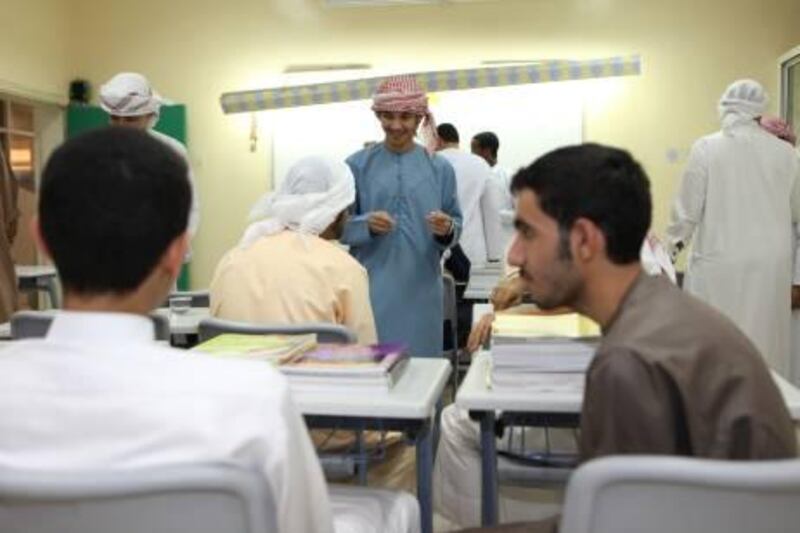DUBAI // Public schools are teaching a weak yet rigid curriculum that forces too many children to repeat several years, according to a report released yesterday by the emirate's education watchdog.
The 2011 Annual Report by the Dubai Schools Inspection Bureau (DSIB), part of the Knowledge and Human Development Authority (KHDA), calls on the Ministry of Education to tackle weaknesses in the structure and implementation of the curriculum.
MORE UAE NEWS: Our pick of today's top local news stories
Enoc Group: petrol stations in Northern Emirates won't change hands Company says officials are 'actively discussing fuel distribution in the Northern Emirates' as its stations remain dry. Read article
Maid 'beaten by employers with wire and wood' settles case out of court Maid claims that her Dubai-based employers beat her after she slept in.Read article
Britons could pay tax on UAE earnings British expatriates in the UAE will soon have to pay income tax to the UK if they stay in their home country for 183 days. Read article
[ MORE UAE NEWS ]
The KHDA began inspections in 2008, and found glaring shortcomings in the 79 government schools and 15 private schools that follow the ministry curriculum.
It noted poor skills in Arabic, English, maths and science. The education system has also been criticised for a lack of choice offered to older pupils, and inadequate tuition time.
Jameela Al Muhairi, the head of the inspection bureau, said many children had told inspectors they were unhappy with the way they were learning English. The result, she said, was that "their progress and attainment has, unfortunately, not been significant".
Though teaching had improved over the years, there was still much to be done to raise standards for the 27,213 pupils in public schools, according to officials.
The report has been forwarded to the ministry, which from September will be responsible for assessing public schools in Dubai.
One of the biggest hurdles was the large number of children who repeatedly fail their end-of-year examinations and have to repeat one or more years.
This included pupils with special educational needs and enforced many students' sense of failure year after year, the inspectors said. They found many cases of mismatch between the grade level and the age of the child, sometimes by about five years.
"We have seen 15- and 16-year-old children in grade four," she said, calling for the practice of failing pupils to be ended.
She pointed to Britain and Norway, where schools "do not believe in failing pupils".
"There should be a support programme in place for these children to continue their education."
Dr Natasha Ridge, the executive director of the Al Qasimi Foundation for Policy Research, said teachers were not trained to tailor their lessons to pupils' individual needs.
In cases where pupils were performing poorly, she said, “there needs to be an early intervention plan where the problem is identified and pupils are given the help they need to pass, rather than waiting for them to fail and holding them back.”
She said there should also be a limit on the number of times a child could repeat a year.
“A remedial and counselling programme must be introduced to determine the causes.”
During her own research in public schools she found that most of the support children received from teachers was verbal. “They would be encouraged to work harder but not particularly helped in the areas they were lacking in.”
Ahmed Al Shaiba, a member on the board of model public schools, said constant failure had a negative impact on children’s self-esteem. “They start considering themselves as bad students and lose interest in the entire education system.”
A low score in one subject should not damage their future prospects, he said. “Not everyone is academically inclined and some pupils have learning disabilities. Education has to take their individual capabilities into consideration.”
While the inspectors found significant advances in state schools for girls, boys were lagging in the secondary school years. They suffered from an uninspiring learning environment, with bare classroom walls and little to motivate pupils or teachers.
Despite this, public schools had managed to improve their ratings, with six now classed as “outstanding” and 33 as “good”. Another 39 were “acceptable” and only one “unsatisfactory”. Last year, 37 schools were “acceptable” and eight “unsatisfactory”.
But public school children were still underperforming in relation to international benchmarks.
Maths and science results were rated as good in only 40-45 per cent of public schools, while English language skills were unacceptable in one public school in three.
Too many lessons were being taught from a textbook, with teachers doing most of the talking.
Ayesha Al Lootah, the principal of the Al Ibdaa School, said the insitution had been trying to address the shortcomings that came up in reports.
“We have started training our teachers so that they can use more innovative methods in teaching their subjects,” she said.
“As we know, English and mathematics are areas where our pupils need more practice.” Because of that, she said, “we have also been holding workshops to broaden their understanding”.
The ministry has also been advised to strengthen leadership and autonomy in public schools. Without that, say officials, it will be hard to make significant changes in teaching, learning and assessment.
Dr Abdulla Al Karam, the director general of the KHDA, said the report provided a complete diagnosis of education in the emirate.
“We have moved from a culture where inspections were unheard of to one that has been accepted as an instrument of change.”
He said the model applied to assess schools worked across the country’s diverse educational establishments.
“If we have managed to successfully highlight the strengths and weaknesses of the system, it can be done in any emirate to achieve the same results.”
The ministry of education was not available for comment yesterday.






